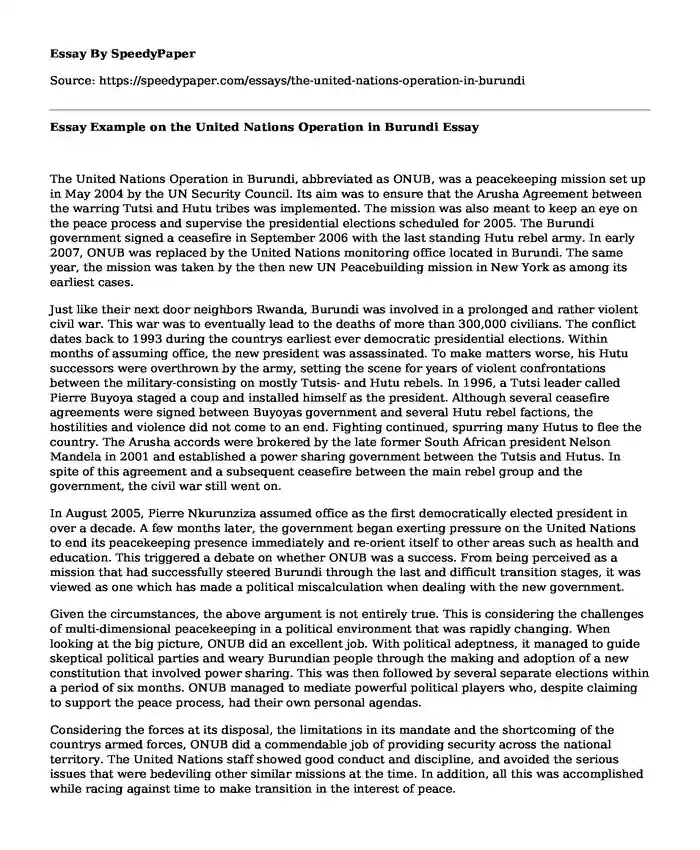
| Type of paper: | Essay |
| Categories: | International relations War |
| Pages: | 3 |
| Wordcount: | 683 words |
The United Nations Operation in Burundi, abbreviated as ONUB, was a peacekeeping mission set up in May 2004 by the UN Security Council. Its aim was to ensure that the Arusha Agreement between the warring Tutsi and Hutu tribes was implemented. The mission was also meant to keep an eye on the peace process and supervise the presidential elections scheduled for 2005. The Burundi government signed a ceasefire in September 2006 with the last standing Hutu rebel army. In early 2007, ONUB was replaced by the United Nations monitoring office located in Burundi. The same year, the mission was taken by the then new UN Peacebuilding mission in New York as among its earliest cases.
Just like their next door neighbors Rwanda, Burundi was involved in a prolonged and rather violent civil war. This war was to eventually lead to the deaths of more than 300,000 civilians. The conflict dates back to 1993 during the countrys earliest ever democratic presidential elections. Within months of assuming office, the new president was assassinated. To make matters worse, his Hutu successors were overthrown by the army, setting the scene for years of violent confrontations between the military-consisting on mostly Tutsis- and Hutu rebels. In 1996, a Tutsi leader called Pierre Buyoya staged a coup and installed himself as the president. Although several ceasefire agreements were signed between Buyoyas government and several Hutu rebel factions, the hostilities and violence did not come to an end. Fighting continued, spurring many Hutus to flee the country. The Arusha accords were brokered by the late former South African president Nelson Mandela in 2001 and established a power sharing government between the Tutsis and Hutus. In spite of this agreement and a subsequent ceasefire between the main rebel group and the government, the civil war still went on.
In August 2005, Pierre Nkurunziza assumed office as the first democratically elected president in over a decade. A few months later, the government began exerting pressure on the United Nations to end its peacekeeping presence immediately and re-orient itself to other areas such as health and education. This triggered a debate on whether ONUB was a success. From being perceived as a mission that had successfully steered Burundi through the last and difficult transition stages, it was viewed as one which has made a political miscalculation when dealing with the new government.
Given the circumstances, the above argument is not entirely true. This is considering the challenges of multi-dimensional peacekeeping in a political environment that was rapidly changing. When looking at the big picture, ONUB did an excellent job. With political adeptness, it managed to guide skeptical political parties and weary Burundian people through the making and adoption of a new constitution that involved power sharing. This was then followed by several separate elections within a period of six months. ONUB managed to mediate powerful political players who, despite claiming to support the peace process, had their own personal agendas.
Considering the forces at its disposal, the limitations in its mandate and the shortcoming of the countrys armed forces, ONUB did a commendable job of providing security across the national territory. The United Nations staff showed good conduct and discipline, and avoided the serious issues that were bedeviling other similar missions at the time. In addition, all this was accomplished while racing against time to make transition in the interest of peace.
Bibliography
Barash, David P., and Charles P. Webel. Peace and Conflict Studies. New York: Sage, 3rd edition.
Boutellis, Arthur, and Paul D. Williams. "Peace operations, the African Union, and the United Nations: Toward more effective partnerships." IPI Policy Papers (2013).
Hultman, Lisa, Jacob Kathman, and Megan Shannon. "United Nations peacekeeping and civilian protection in civil war." American Journal of Political Science 57, no. 4 (2013): 875-891.
MacQueen, Norrie. United Nations peacekeeping in Africa since 1960. Routledge, 2014.
Ruggeri, Andrea, Han Dorussen, and Theodora-Ismene Gizelis. "On the frontline every day? Subnational deployment of United Nations peacekeepers." British Journal of Political Science (2016).
Ryan, Stephen. The United Nations and International Politics. New York: St. Martins Press.
Williams, Paul D., and Arthur Boutellis. "Partnership peacekeeping: challenges and opportunities in the United NationsAfrican Union Relationship." African Affairs 113, no. 451 (2014): 254-278.
Cite this page
Essay Example on the United Nations Operation in Burundi. (2019, Nov 18). Retrieved from https://speedypaper.net/essays/the-united-nations-operation-in-burundi
Request Removal
If you are the original author of this essay and no longer wish to have it published on the SpeedyPaper website, please click below to request its removal:
- Evaluation of the Novel Billy Budd, Essay Sample
- Essay Example: The Impacts of Social Networking Sites (SNSs)
- Hepatic Steatosis Essay Sample
- Free Paper Example: The Creative Curriculum for Preschool
- Nutrition Essay Sample: Properties that make Vegan Menus better than Vegetarian Intake
- Research Paper on Shortage of Airline Pilots in the United States
- Civil-Military Relations, Comparison Between Turkey and Egypt Before and After Arab Spring. Essay Example
Popular categories




